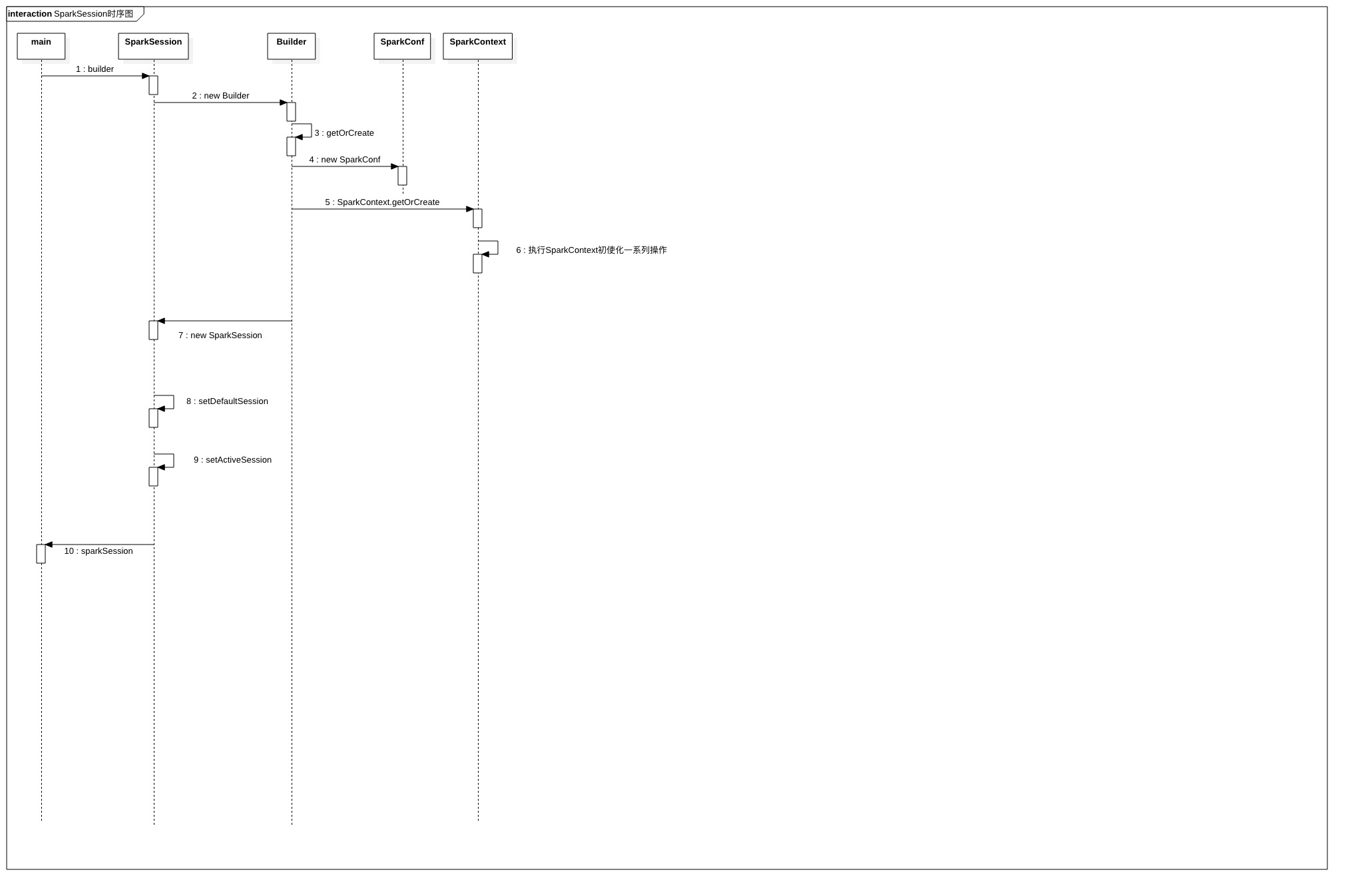Spark2.4.0 SparkSession 源码分析
更多资源
时序图

前置条件
- Hadoop版本: hadoop-2.9.2
- Spark版本: spark-2.4.0-bin-hadoop2.7
- JDK.1.8.0_191
- scala2.11.12
主要内容描述
- 创建SparkContext
- new SparkSession
客户端程序
BaseSparkSession 工具类
package com.opensource.bigdata.spark.standalone.base
import java.io.File
import org.apache.spark.sql.SparkSession
/**
* 得到SparkSession
* 首先 extends BaseSparkSession
* 本地: val spark = sparkSession(true)
* 集群: val spark = sparkSession()
*/
class BaseSparkSession {
var appName = "sparkSession"
var master = "spark://standalone.com:7077" //本地模式:local standalone:spark://master:7077
def sparkSession(): SparkSession = {
val spark = SparkSession.builder
.master(master)
.appName(appName)
.config("spark.eventLog.enabled","true")
.config("spark.history.fs.logDirectory","hdfs://standalone.com:9000/spark/log/historyEventLog")
.config("spark.eventLog.dir","hdfs://standalone.com:9000/spark/log/historyEventLog")
.getOrCreate()
spark.sparkContext.addJar("/opt/n_001_workspaces/bigdata/spark-scala-maven-2.4.0/target/spark-scala-maven-2.4.0-1.0-SNAPSHOT.jar")
//import spark.implicits._
spark
}
def sparkSession(isLocal:Boolean = false, isHiveSupport:Boolean = false, remoteDebug:Boolean=false): SparkSession = {
val warehouseLocation = new File("spark-warehouse").getAbsolutePath
if(isLocal){
master = "local"
var builder = SparkSession.builder
.master(master)
.appName(appName)
.config("spark.sql.warehouse.dir",warehouseLocation)
if(isHiveSupport){
builder = builder.enableHiveSupport()
//.config("spark.sql.hive.metastore.version","2.3.3")
}
val spark = builder.getOrCreate()
//spark.sparkContext.addJar("/opt/n_001_workspaces/bigdata/spark-scala-maven-2.4.0/target/spark-scala-maven-2.4.0-1.0-SNAPSHOT.jar")
//import spark.implicits._
spark
}else{
var builder = SparkSession.builder
.master(master)
.appName(appName)
.config("spark.sql.warehouse.dir",warehouseLocation)
.config("spark.eventLog.enabled","true")
.config("spark.eventLog.compress","true")
.config("spark.history.fs.logDirectory","hdfs://standalone.com:9000/spark/log/historyEventLog")
.config("spark.eventLog.dir","hdfs://standalone.com:9000/spark/log/historyEventLog")
//executor debug,是在提交作的地方读取
if(remoteDebug){
builder.config("spark.executor.extraJavaOptions","-Xdebug -Xrunjdwp:transport=dt_socket,server=y,suspend=y,address=10002")
}
if(isHiveSupport){
builder = builder.enableHiveSupport()
//.config("spark.sql.hive.metastore.version","2.3.3")
}
val spark = builder.getOrCreate()
//需要有jar才可以在远程执行
spark.sparkContext.addJar("/opt/n_001_workspaces/bigdata/spark-scala-maven-2.4.0/target/spark-scala-maven-2.4.0-1.0-SNAPSHOT.jar")
spark
}
}
/**
* 得到当前工程的路径
* @return
*/
def getProjectPath:String=System.getProperty("user.dir")
}
客户端程序
package com.opensource.bigdata.spark.standalone.sql.dataset.n_01_textFile_head
import com.opensource.bigdata.spark.standalone.base.BaseSparkSession
object Run extends BaseSparkSession{
appName = "Dataset head"
def main(args: Array[String]): Unit = {
val spark = sparkSession(false,false,false)
//返回dataFrame
val df = spark.read.textFile("data/text/line.txt")
val result = df.head(3)
println(s"运行结果: ${result.mkString("\n")}")
spark.stop()
}
}
SparkSession
SparkSession.Builder
var builder = SparkSession.builder
.master(master)
.appName(appName)
.config("spark.sql.warehouse.dir",warehouseLocation)
.config("spark.eventLog.enabled","true")
.config("spark.eventLog.compress","true")
.config("spark.history.fs.logDirectory","hdfs://standalone.com:9000/spark/log/historyEventLog")
.config("spark.eventLog.dir","hdfs://standalone.com:9000/spark/log/historyEventLog")
SparkSession.Builder.getOrCreate()
- 得到SparkSession
- new SparkConf()
- 调用SparkContext.getOrCreate(sparkConf)构建SparkContext
- new SparkSession(sparkContext, None, None, extensions) 实例化SparkSession
- setDefaultSession(session)
- setActiveSession(session)
/**
* Gets an existing [[SparkSession]] or, if there is no existing one, creates a new
* one based on the options set in this builder.
*
* This method first checks whether there is a valid thread-local SparkSession,
* and if yes, return that one. It then checks whether there is a valid global
* default SparkSession, and if yes, return that one. If no valid global default
* SparkSession exists, the method creates a new SparkSession and assigns the
* newly created SparkSession as the global default.
*
* In case an existing SparkSession is returned, the config options specified in
* this builder will be applied to the existing SparkSession.
*
* @since 2.0.0
*/
def getOrCreate(): SparkSession = synchronized {
assertOnDriver()
// Get the session from current thread's active session.
var session = activeThreadSession.get()
if ((session ne null) && !session.sparkContext.isStopped) {
options.foreach { case (k, v) => session.sessionState.conf.setConfString(k, v) }
if (options.nonEmpty) {
logWarning("Using an existing SparkSession; some configuration may not take effect.")
}
return session
}
// Global synchronization so we will only set the default session once.
SparkSession.synchronized {
// If the current thread does not have an active session, get it from the global session.
session = defaultSession.get()
if ((session ne null) && !session.sparkContext.isStopped) {
options.foreach { case (k, v) => session.sessionState.conf.setConfString(k, v) }
if (options.nonEmpty) {
logWarning("Using an existing SparkSession; some configuration may not take effect.")
}
return session
}
// No active nor global default session. Create a new one.
val sparkContext = userSuppliedContext.getOrElse {
val sparkConf = new SparkConf()
options.foreach { case (k, v) => sparkConf.set(k, v) }
// set a random app name if not given.
if (!sparkConf.contains("spark.app.name")) {
sparkConf.setAppName(java.util.UUID.randomUUID().toString)
}
SparkContext.getOrCreate(sparkConf)
// Do not update `SparkConf` for existing `SparkContext`, as it's shared by all sessions.
}
// Initialize extensions if the user has defined a configurator class.
val extensionConfOption = sparkContext.conf.get(StaticSQLConf.SPARK_SESSION_EXTENSIONS)
if (extensionConfOption.isDefined) {
val extensionConfClassName = extensionConfOption.get
try {
val extensionConfClass = Utils.classForName(extensionConfClassName)
val extensionConf = extensionConfClass.newInstance()
.asInstanceOf[SparkSessionExtensions => Unit]
extensionConf(extensions)
} catch {
// Ignore the error if we cannot find the class or when the class has the wrong type.
case e @ (_: ClassCastException |
_: ClassNotFoundException |
_: NoClassDefFoundError) =>
logWarning(s"Cannot use $extensionConfClassName to configure session extensions.", e)
}
}
session = new SparkSession(sparkContext, None, None, extensions)
options.foreach { case (k, v) => session.initialSessionOptions.put(k, v) }
setDefaultSession(session)
setActiveSession(session)
// Register a successfully instantiated context to the singleton. This should be at the
// end of the class definition so that the singleton is updated only if there is no
// exception in the construction of the instance.
sparkContext.addSparkListener(new SparkListener {
override def onApplicationEnd(applicationEnd: SparkListenerApplicationEnd): Unit = {
defaultSession.set(null)
}
})
}
return session
}
SparkContext.getOrCreate(sparkConf)
- 构建SparkContext
/**
* This function may be used to get or instantiate a SparkContext and register it as a
* singleton object. Because we can only have one active SparkContext per JVM,
* this is useful when applications may wish to share a SparkContext.
*
* @note This function cannot be used to create multiple SparkContext instances
* even if multiple contexts are allowed.
* @param config `SparkConfig` that will be used for initialisation of the `SparkContext`
* @return current `SparkContext` (or a new one if it wasn't created before the function call)
*/
def getOrCreate(config: SparkConf): SparkContext = {
// Synchronize to ensure that multiple create requests don't trigger an exception
// from assertNoOtherContextIsRunning within setActiveContext
SPARK_CONTEXT_CONSTRUCTOR_LOCK.synchronized {
if (activeContext.get() == null) {
setActiveContext(new SparkContext(config), allowMultipleContexts = false)
} else {
if (config.getAll.nonEmpty) {
logWarning("Using an existing SparkContext; some configuration may not take effect.")
}
}
activeContext.get()
}
}
end























 1409
1409

 被折叠的 条评论
为什么被折叠?
被折叠的 条评论
为什么被折叠?








